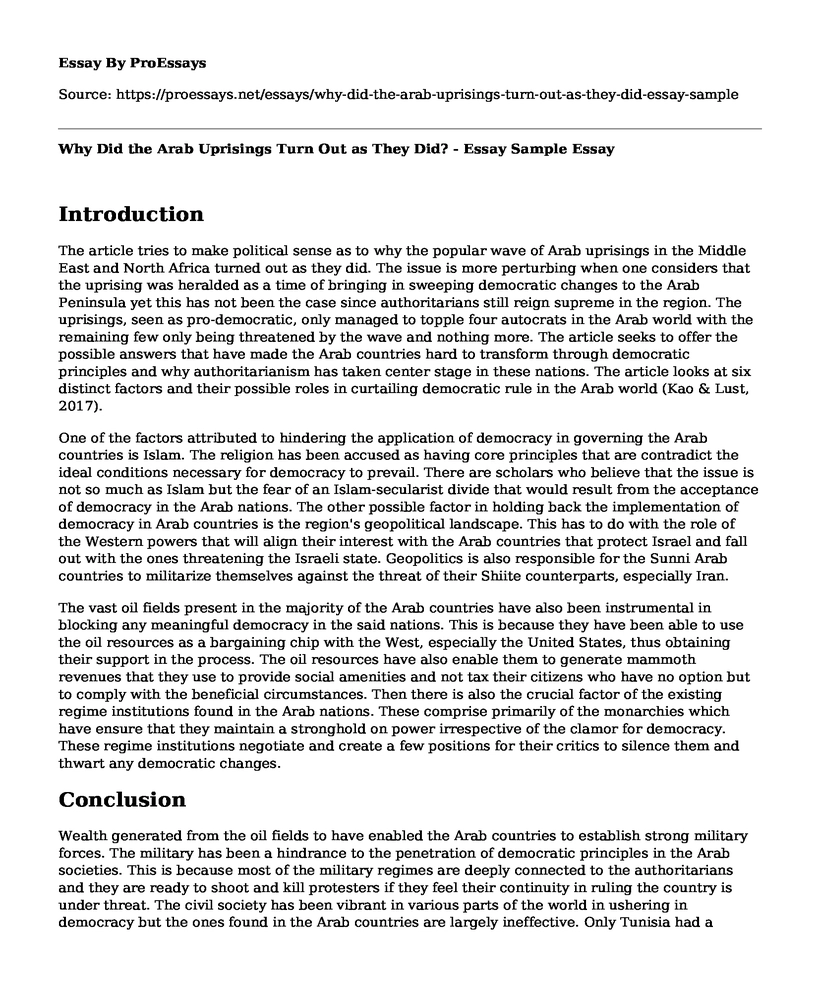Introduction
The article tries to make political sense as to why the popular wave of Arab uprisings in the Middle East and North Africa turned out as they did. The issue is more perturbing when one considers that the uprising was heralded as a time of bringing in sweeping democratic changes to the Arab Peninsula yet this has not been the case since authoritarians still reign supreme in the region. The uprisings, seen as pro-democratic, only managed to topple four autocrats in the Arab world with the remaining few only being threatened by the wave and nothing more. The article seeks to offer the possible answers that have made the Arab countries hard to transform through democratic principles and why authoritarianism has taken center stage in these nations. The article looks at six distinct factors and their possible roles in curtailing democratic rule in the Arab world (Kao & Lust, 2017).
One of the factors attributed to hindering the application of democracy in governing the Arab countries is Islam. The religion has been accused as having core principles that are contradict the ideal conditions necessary for democracy to prevail. There are scholars who believe that the issue is not so much as Islam but the fear of an Islam-secularist divide that would result from the acceptance of democracy in the Arab nations. The other possible factor in holding back the implementation of democracy in Arab countries is the region's geopolitical landscape. This has to do with the role of the Western powers that will align their interest with the Arab countries that protect Israel and fall out with the ones threatening the Israeli state. Geopolitics is also responsible for the Sunni Arab countries to militarize themselves against the threat of their Shiite counterparts, especially Iran.
The vast oil fields present in the majority of the Arab countries have also been instrumental in blocking any meaningful democracy in the said nations. This is because they have been able to use the oil resources as a bargaining chip with the West, especially the United States, thus obtaining their support in the process. The oil resources have also enable them to generate mammoth revenues that they use to provide social amenities and not tax their citizens who have no option but to comply with the beneficial circumstances. Then there is also the crucial factor of the existing regime institutions found in the Arab nations. These comprise primarily of the monarchies which have ensure that they maintain a stronghold on power irrespective of the clamor for democracy. These regime institutions negotiate and create a few positions for their critics to silence them and thwart any democratic changes.
Conclusion
Wealth generated from the oil fields to have enabled the Arab countries to establish strong military forces. The military has been a hindrance to the penetration of democratic principles in the Arab societies. This is because most of the military regimes are deeply connected to the authoritarians and they are ready to shoot and kill protesters if they feel their continuity in ruling the country is under threat. The civil society has been vibrant in various parts of the world in ushering in democracy but the ones found in the Arab countries are largely ineffective. Only Tunisia had a vibrant civil society that helped in toppling the previous regime. The Arab countries have the civil societies tightly wrapped around their fingers because the ruling elite have resorted to having NGOs that are organized and funded by the government. They are thus toothless and easy to control.
Reference
Kao, K. & Lust, E. (2017). Why did the Arab uprisings turn out as they did? A survey of the literature. Project on Middle East Democracy.
Cite this page
Why Did the Arab Uprisings Turn Out as They Did? - Essay Sample. (2022, Dec 05). Retrieved from https://proessays.net/essays/why-did-the-arab-uprisings-turn-out-as-they-did-essay-sample
If you are the original author of this essay and no longer wish to have it published on the ProEssays website, please click below to request its removal:
- Treaty on the Non-Proliferation of Nuclear Weapons Essay
- Essay on American Presidency General Elections in Alabama Since 2000
- Compare and Contrast Paper on Nationalism and Imperialism
- Essay Sample on 2020 Election: Historic Women Candidates Ready to Run
- Essay Sample on Government Policies for Effective Response to Global Pandemic
- Free Essay Example: Facebook's Controversial Privacy Policies and Impact on Emotions
- Demystifying Trademark Law: Elements, Distinctiveness, Infringement, and Fair Use Explained - Paper Example







